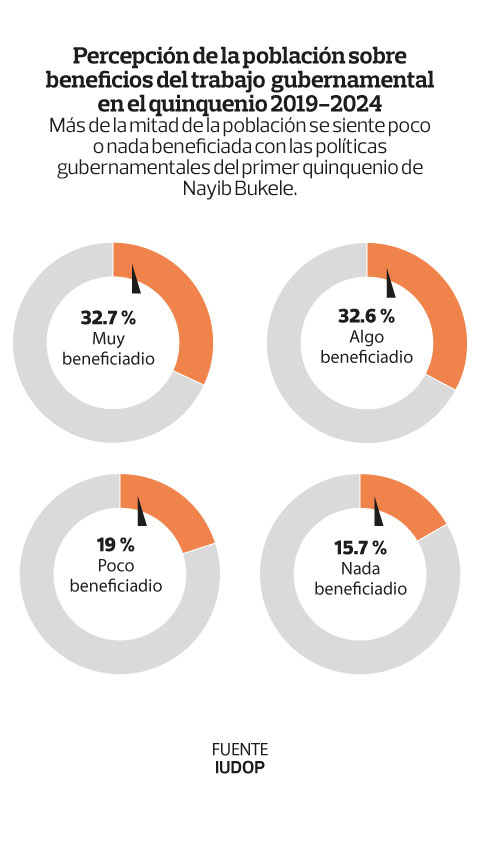A public opinion poll conducted by the University of Central Asia once again reflects that the economy is what most worries Salvadoran citizens
With the end of his first term (2019-2024), about 47.2% of the population believes that the President of the Republic, Nayib Bukele, is far from him, according to the results of the latest poll conducted by the University Research Institute. The Public Opinion (IUDOP) was presented by the José Simeon Cañas University of Central America (UCA), on Wednesday.
Among the people surveyed, those who considered it “very close” were only 5.1%, those who considered it “soon” were 33.5%, and those who answered “neither this nor that” were 11.5%, while “far” was 27.9%, and “far “Very” was 19.3%, and in the “does not know, does not answer” category, it was only 2.8% of those interviewed.
With the above, it turns out that 38.6% see some rapprochement, which is the lowest level since he took power in 2019, compared to 47.2% of people who do not see that.
Populations that view the president as distant or too distant often embody this through a lack of closeness with citizens, and another sector sees their needs as not being met.
Read: 42 out of every 100 Salvadorans do not know what democracy is, according to an EUDOP poll
Those who answered yes to the perception of the president’s closeness to the population claimed to perceive it because of his “work for the people,” “listening” to their needs, or “caring” about the poor; Among other reasons.
On the other hand, those who did not feel close indicate that they have never contacted him (38.2%), because he does not visit the territories or colonies (10.7%), because he does not listen to their needs. Population (10.4%), because it does not take into account some sectors of the population (8.9%), because the only thing that matters to it is power (3%), because it only cares about its popularity (2.5%), because it does not participate in some of the decisions it made ( 2.3%); Among other reasons.
In conjunction with the perception of a lack of closeness to the governor, the majority of the population surveyed (70.8%) saw that at the end of the five-year period, Salvadoran citizens had become more united because there was more security in the country, because the country’s majority population supported the government or for other reasons. Although a large percentage (17.5%) also believed that the opposite was true.
Those who claimed that the Salvadoran population was more divided attributed this mainly to the fact that there is no tolerance for opinions different from those of the government, and there is more distrust among the people, because not all sectors of the population are taken into account, there is no democracy, than Among other reasons.
You can read: Freedoms of expression and assembly are the most violated in the country, according to FESPAD records
However, President Bukele ended his five-year term with a rating of 8.28, a slight decline compared to other years’ ratings.
UCA’s Vice Chancellor of Social Prospects, Omar Serrano, links good evaluation to the same results that reflect the population’s sense of satisfaction with the security policies implemented by the government.
“83.5% believe that the main achievement of this government is security, 85.1% believe that the emergency system has helped control crime and 96.8% believe that crime has decreased; “This is the most unanimous response in the entire survey,” Serrano said.

Classification and level of trust in ministries
Of the 15 executive branch institutions that the survey measured the level of trust in the population, 14 maintained a score of 7 and only one received a score of 6.
The three best-rated institutions were the Ministry of Justice and Public Security, the Ministry of Tourism, and the Ministry of Defense. While the Ministry of Economy, the Ministry of Environment and Natural Resources, and the Ministry of Labor were the worst rated.
| institution | Punctuation |
| Justice and public safety | 7.98 |
| tourism | 7.93 |
| Defense | 7.92 |
| Education, science and technology | 7.89 |
| Foreign relations | 7.52 |
| public works | 7.5 |
| health | 7.47 |
| Government and regional development | 7.39 |
| culture | 7.32 |
| tax authority | 7.21 |
| Agency of the Ministry of Transport | 7.2 |
| Agriculture and livestock | 7.17 |
| job | 7.13 |
| environment | 7.1 |
| Economy | 6.52 |
The demand to improve the economy is still there
The survey again reflected that the main criticisms relate to the country’s economic management.
Nearly 74 out of every 100 Salvadorans believe that economic aspects (poverty, high costs of living, unemployment, among others) today represent the main problem facing the country.
Moreover, although 43 out of every 100 Salvadorans do not identify any failure at the end of this fifth year of administration, nearly a third of the population (29.3%) identify some issues related to the national economy as the main failure.
At this point, it is important to point out that although a large portion of Salvadorans did not identify failures in the first five years of the Bukele administration, since 2021 there has been an increase in the proportion of people who consider the country’s main failure. This government is the economic situation of the country, reaching an increase of 25 percentage points when comparing 2021 (3.9%) with the 2024 measurement (29.3%).

“Music buff. Social media lover. Web specialist. Analyst. Organizer. Travel trailblazer.”







More Stories
Nicaragua picks up and delivers to El Salvador four subjects circulated by Interpol
UN experts have warned of serious human rights violations in the context of the presidential elections scheduled for July 28 in Venezuela.
The Organization of American States deploys observers for the US elections